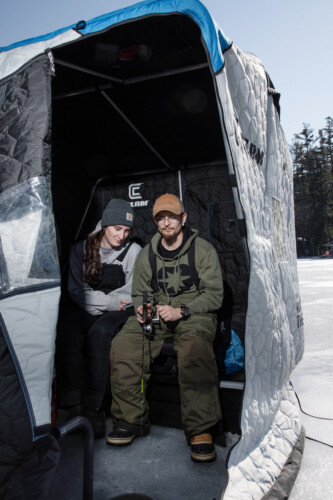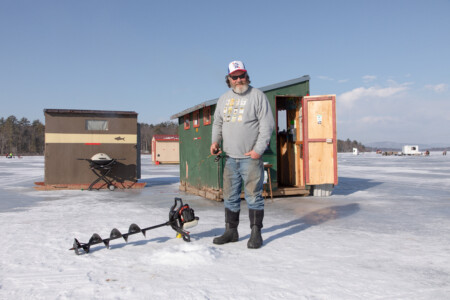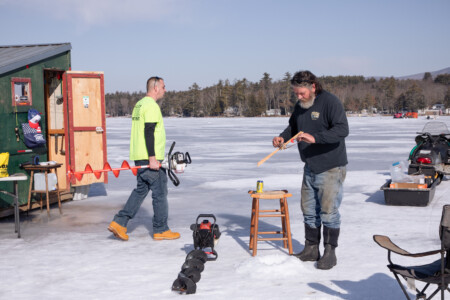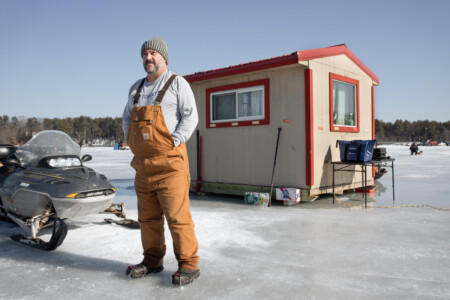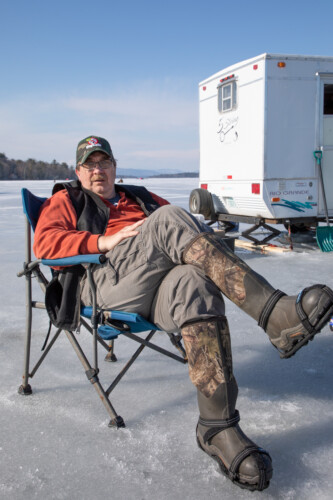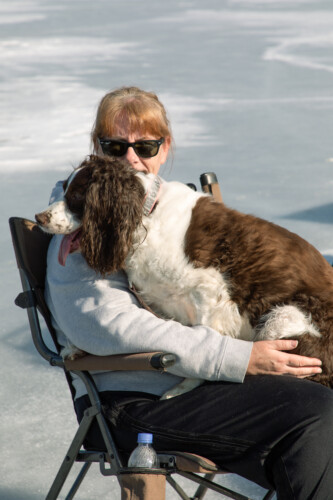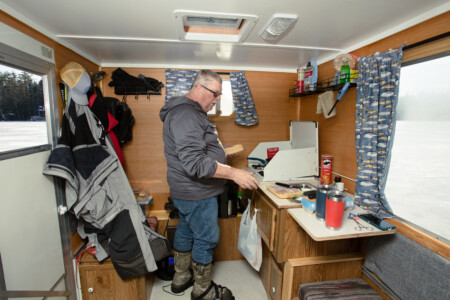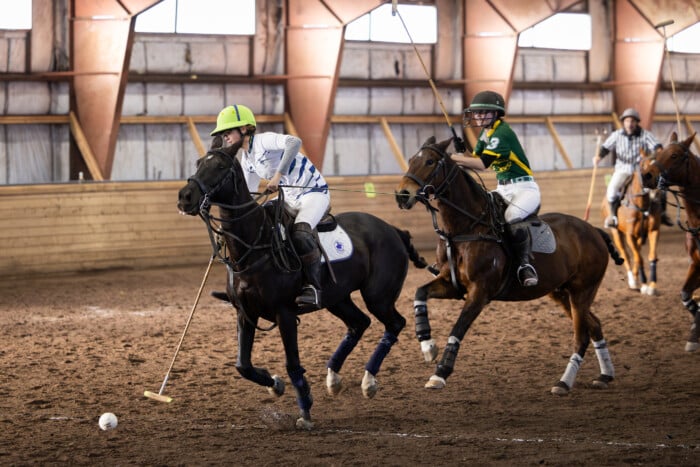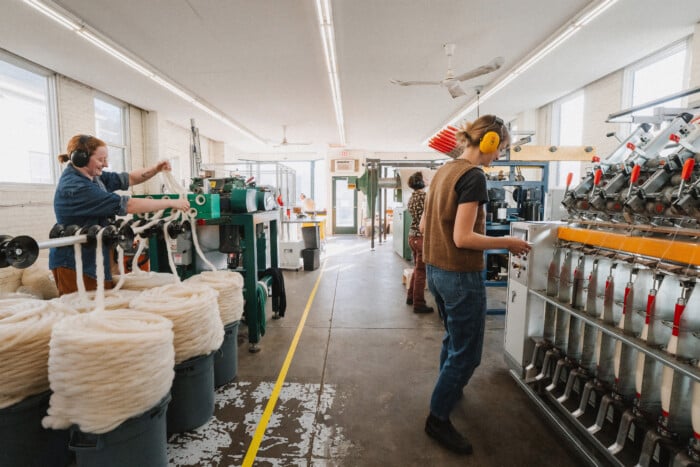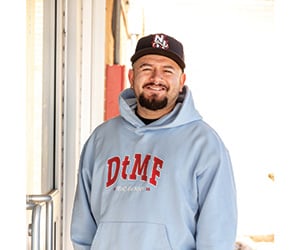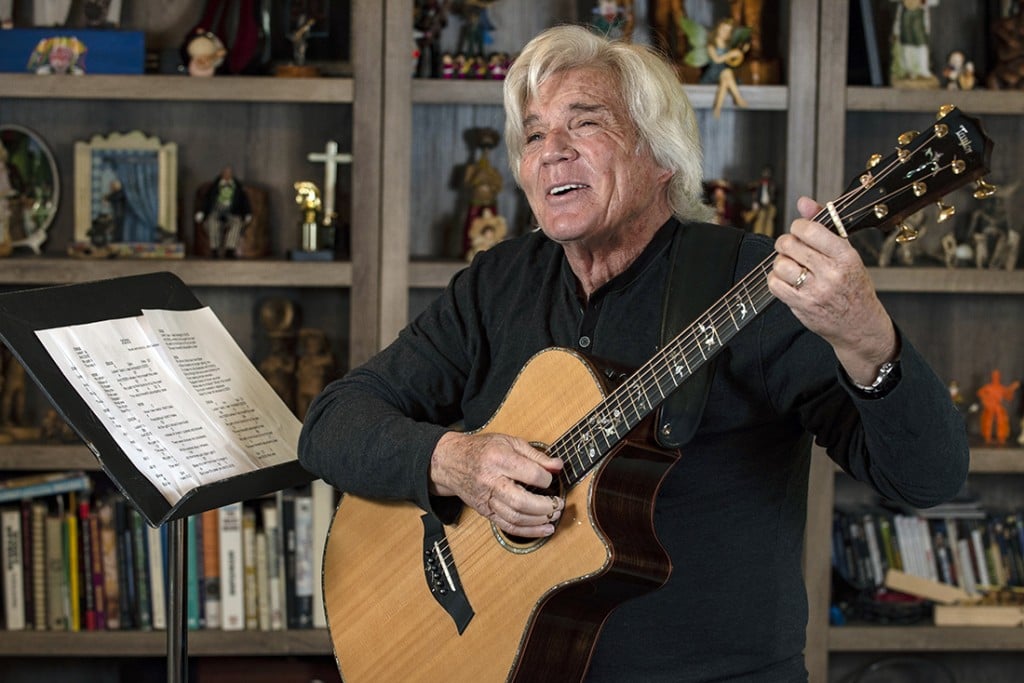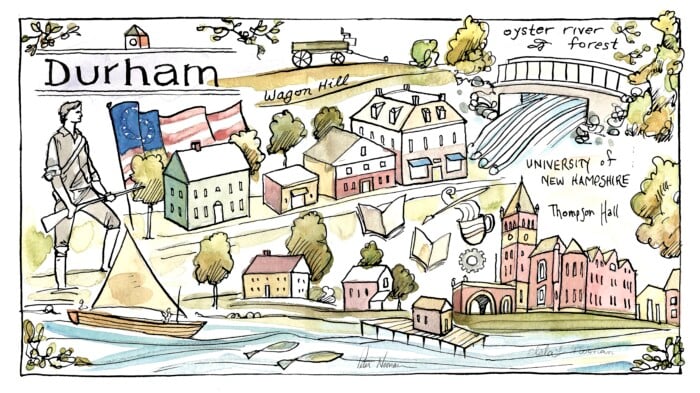Lake Winnipesaukee Bobhouses On Thin Ice
The twilight of bobhouses on Winnipesaukee may have arrived

Although at 22 he’s arguably a little young to fully appreciate the sentiment, ice fisherman Vincent Zuccaro is nostalgic for the days of good, thick ice on Lake Winnipesaukee — days he knows might not soon return.
A plumber from Townsend, Mass., whose family has a vacation home in Tuftonboro, Zuccaro has been ice fishing back home since he was 10. Since he was 17, he has participated in the Great Meredith Rotary Fishing Derby, the quintessential event of its kind on the Big Lake.
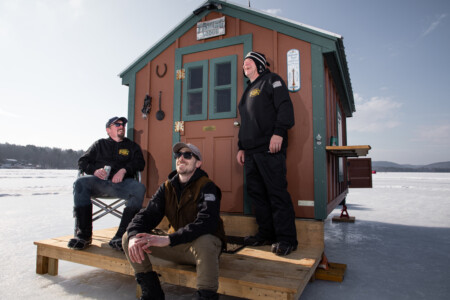
Brothers Keith, Adam and Jim McCarthy enjoy some laughs at their bobhouse on Lake Waukewan at the 2024 Meredith Rotary Ice Fishing Derby.
In the seven years leading up to the 2024 Derby, he has noticed that the amount of full-size bobhouses has decreased as “ ‘ice in’ came later and later.” Zuccaro has also observed a corresponding increase in the number of “pop-up” fishing shelters.
“I definitely remember a time on the lake when the ice was thick, and I used to be able to take an ATV out onto 15 to 16 inches of ice (in 19 Mile Bay), and it would get thicker in the middle,” he said.
Zuccaro likes to think he can get his bobhouse back onto Lake Winnipesaukee again in the future: “But I don’t have super high hopes with the way the lake has been freezing and the way the temperature” keeps going up.
Zuccaro is not alone in feeling the way he does.
In the Lakes Region, the warming winter weather has played havoc with traditional events, like the derby, which this year is scheduled for February 8 -9, and is preceded by the New England Pond Hockey Classic, January 31-February 2.
In the last two years, both the Pond Hockey Classic and fishing derby have taken place, but the action was not where it had been, on Meredith Bay, on the upper reaches of Lake Winnipesaukee. Because Meredith Bay was not properly frozen in, the Pond Hockey Classic in 2024, again, was relocated to Lake Waukewan.
While derby headquarters remained in Hesky Park, on the western shore of Meredith Bay, the bay itself was mostly devoid of ice fishermen, and entirely devoid of bobhouses.
In the not-so-distant past, bobhouses — and the pickup trucks and ATVs that pulled them on and off the ice — filled Meredith Bay, not just for the derby, but for much of the winter. It was not uncommon to not be able to see across Meredith Bay because it was literally filled with ice-fishing men and women and their equipment.
During the 2024 ice fishing derby, bobhouses on Lake Winnipesaukee were scarce. Among the few places they could be found was on 19 Mile Bay in Tuftonboro.
Eric Kelsey, Ph.D., a research assistant professor in meteorology at Plymouth State University, said New Hampshire is locked into a pattern of generally warmer weather for the next several decades, which means the days of traditional ice-related winter activities are numbered.
“As the climate continues to warm, there will be fewer and fewer days when there will be thick enough ice for people to safely walk on to it,” said Kelsey, let alone support the weights of a bobhouse — which empty can weigh the better part of a ton — and of the vehicles that position the bobhouses on the ice.
Eventually, said Kelsey, “It will come to a point where we will have winters where the ice in many of the ponds and lakes that traditionally had ice thick enough for vehicles will not get it,” adding there are weather projections that say that may occur “some time this century.”
Regardless, he said, there will probably always be ice fishing in New Hampshire because fishermen can take their bobhouses to smaller ponds or lakes, including to those in the Great North Woods of Coos County.
According to Great Meredith Rotary Fishing Derby rules, “All fish must be legally and freshly caught from any fresh New Hampshire public waters,” and must be taken “through the ice on Saturday or Sunday of Derby Weekend.”
In the 2024 derby, the winning pickerel was caught on Lake Francis in Pittsburg, while the biggest lake trout came from Diamond Pond, in Coleman State Park in Stewartstown.
The go-north option “is only going to last for a limited amount of time,” said Kelsey, “and at some point, even into southern Canada, they will see very fewer days” of being able to safely drive onto a seemingly frozen lake to drop off a bobhouse.
Ice conditions on Lake Winnipesaukee are already unpredictable. And on Feb. 11, 2017, they were fatal to three snowmobilers.
Two riders, on their way to the fishing derby’s headquarters, encountered open water between Long Island and Sandy Island. The third crashed through thin ice in The Broads on his way to Alton Bay.
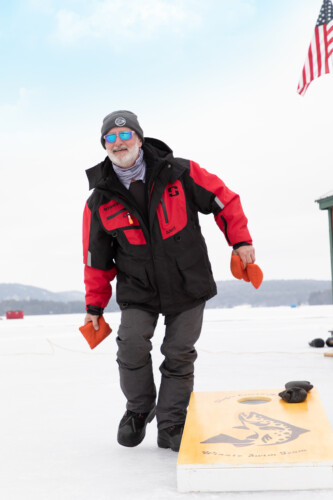
John King play cornhole with friends and family on Lake Waukewan during the 2024 Meredith Rotary Ice Fishing Derby.
More recently, during the winter of 2023-24, which was the warmest on record in New Hampshire, one of the latest “ice-in” declarations on Lake Winnipesaukee was made on Feb. 9, and was followed on March 17 by the earliest-ever “ice-out” declaration.
“Ice-out” is the term when the M/S Mount Washington cruise ship can safely make her way to each of her five ports.
Kelsey said “ice out” has been arriving sooner while the harvesting of ice from Squam Lake for use in ice boxes at the Rockywold Deephaven Camps in Holderness has been coming later.
When asked about a possible halt or reversal of the warming-winter trend, Kelsey was unequivocal that he doesn’t foresee either.
“The warming trend will continue, and there is already some warming locked into the system,” he said, explaining that even “if we stop polluting or adding greenhouse gases, we would still see 20 to 30 years of warming,” with a concurrent “shrinking” of the days of on-ice activities.
There is a silver lining, however, in that “the human species is quite adaptable, and a lot of people will find a lot of things to do in winter” that don’t rely on snow or ice, Kelsey said.
Bob King, 68, of Ashburnham, Mass., who has done a lot of ice fishing in his life, was among the group of ice fishermen who set up bobhouses in 19 Mile Bay during the 2024 Derby.
An operations manager for an inventory control company, King has participated in the derby since the late 1980s.
“The ice was so thick back then that you could drive your vehicle on it,” he said, recalling that he and his son, John, gradually built a bobhouse with ornate flourishes while rooted in the basics of providing shelter from the elements.
“We had heat, we had a small refrigerator there and we have a table that has a glass top, and underneath it are pictures from when my son was a little kid to the present,” King said. “It’s really cool to see it.”
King remembers that 15 to 20 years ago, “the place to be was in Meredith Bay. There were concession stands, and you could get and see everybody and everything.”
While he plans to keep attending the derby for as long as possible, King is also eyeing the possibility of going farther north to participate in it in his bobhouse, which, when the Derby was offering such prizes, won awards for best-constructed bobhouse and best interior and best exterior.
“It’s a really comfortable bobhouse, and when the door is closed, you don’t even feel like you’re on the ice,” said King, who has seen fewer young people take up ice fishing and realizes that as time goes by, he is “part of something that is slowly passing away.”
John McNamara, 60, of the Melvin Village section of Tuftonboro, who owns a landscaping/construction and property-watch business, said he got his first bobhouse from a customer and now has three.
A participant in the derby since moving to New Hampshire from the Finger Lakes region of New York State a quarter-century ago, McNamara said 19 Mile Bay is a good place to put a bobhouse because it is “a very protected cove from the wind” that allows the ice to get thick in that area.
He remembers years when he put his bobhouse out before Christmas and even driving from 19 Mile Bay to derby headquarters and back in his Volvo station wagon.
He agreed that getting a stick-built bobhouse onto the ice “is a big production,” echoing King, that as much as a bobhouse is an ideal place to fish through the ice, it is also a great place to socialize in and around.
“On a nice sunny day, we’ll have 40 to 50 people out here,” he said, adding, “I’m going to be here as long as I can.” But he says he won’t take his bobhouse on the road, and if ice conditions continue to deteriorate, he might “wrap it up.”
If and when that happens, McNamara will have many positive memories to sustain him.
“There was a Labatt’s Blue bottle (bobhouse) that was really cool, and on 19 Mile Bay somebody had a four-person gondola from a local ski area,” he said. “The sunsets every year are fantastic, and when the kids were young and riding snowmobiles it was really fun.”
Although the current trend among ice fishermen is to use a pop-up tent because it is easier to set up and break down, in addition to being much lighter than a bobhouse, McNamara still has a soft spot in his heart for the latter. “If you build it, they will come,” he said.
Bill Ahern, 51, a registered nurse from Pittsfield, Mass., has come up to the derby since the 1990s. Initially, he and his friends fished on Newfound Lake “and it was a blast,” before later heading east to Lake Winnipesaukee.
He and his wife ,Brenda, a registered nurse, have fished in Meredith, Center Harbor, Tuftonboro, Wolfeboro and Alton Bay. In 2019, Ahern built his bobhouse, which he said “started off being something simple but ended up being an 8-by-10-foot over-engineered monstrosity.”
“I built it with some leftover metal studs, and initially I was going to side it with plywood, but I ended up buying the T1-11 stuff and insulated it and wired it” to accommodate a generator and TV, said Ahern, turning his bobhouse “into the Taj Mahal of fishing shacks.”
Concerned about where he could park the large trailer on which he transported his bobhouse, Ahern searched a New Hampshire ice-fishing website and found McNamara, who offered to store the trailer on his property.
“We fished together that first year, and he (McNamara) has let me keep the trailer up there ever since, and he never asked for more than a case of Twisted Tea. That’s his fee for the year,” Ahern said.
Although he is an avowed winter-sports enthusiast — “I used to play hockey and ski, and I’m into ice fishing” — Ahern noted his wife is a “big runner, and it’s difficult for her to run in the winter, so we have talked about, if winter isn’t going to be winter anymore,” to move someplace else to work, which would entail getting rid of his bobhouse and two snowmobiles.
“You need good ice” to safely have a bobhouse,” he said, and “when I bring the bobhouse out I usually tow it out there with my truck. This year we had to dump it (the bobhouse) close to shore, and I brought chains in my quad-runner and we literally dragged it out.”
Herman McGee Jr., 65, a Portsmouth native who now calls Kensington home, said it’s becoming “obvious” that the winters in New Hampshire are changing, even if “you can’t put your finger on all the reasons.”
“When I was younger, it was like a city up there” on Meredith Bay, said McGee, “and you could leave a bobhouse out there for a month and return to it. Now I don’t even like to leave it overnight, and it’s sad because (ice fishing) is so much fun.”
McGee, who remembers ice fishing on Alton Bay “and painstakingly having to drill through 2 feet of ice” with a hand auger to be able to do so, thinks fewer people in general are fishing or hunting.
He has both his bobhouse and a lighter shelter for ice fishing, but the latter is not as nice as the former, said McGee, “and I’m getting old, too. You have to be a hearty person to go out; you have to be able to withstand the cold.”
“As you get older in life, your attitude might change,” he said, “but I enjoy it (ice fishing) right now, and hopefully I won’t lose that.”
Zuccaro sees himself living in New England for the rest of his life, and he dreams of “colder days in December again, and I think that would lead into more consistent ice and the ice itself being in earlier and out later.”
But he’s realistic about that happening.
“I still remember when I was young, that even in northern Massachusetts we had snowbanks that were 8 feet tall, and now they’re not over 3 feet.”
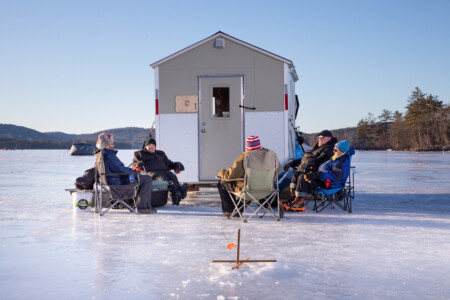
Dennis Babineau, Dave Babineau, John Muir, Mike Babineau and Kevin Ashburner (back to camera) sit outside the bobhouse they rented for the derby.
He wants more people, especially youth, to experience the derby and ice fishing, but realizes that to ice fish himself, he might have to go farther north or maybe even west.
“I would love to take kids out ice fishing but I’m not certain that’s in the cards. I think it all depends on, and I hate to get political, the choices that we as a country make. It’s a right we all have to experience the wilderness as past generations have.”
